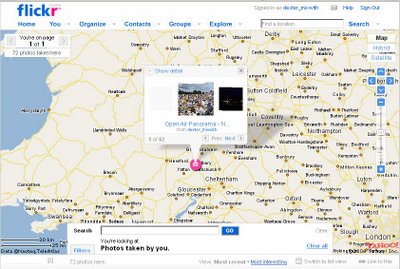So, I'm back in the theatre after bumping into Craig Morey and co from Mindworks, slightly squashed in with my excessive luggage (damn - should've left everything in the cloakroom). Next.
 A pretty interesting and inspiring session looking at the what APIs are, what you can do with mash-ups. Largely from a Yahoo! perspective (not surprising since both the guys work there!) the talk was light on technical detail, but interesting in the way that Yahoo! approach this area of innovation - who days where developers get the chance to try out and show their ideas - great!
A pretty interesting and inspiring session looking at the what APIs are, what you can do with mash-ups. Largely from a Yahoo! perspective (not surprising since both the guys work there!) the talk was light on technical detail, but interesting in the way that Yahoo! approach this area of innovation - who days where developers get the chance to try out and show their ideas - great!
Perhaps more interesting was the Q & A session afterwards - most interesting for me was the question of how to convince the big cheeses to free up their data and make it available through APIs. Still not sure there's a killer business arguement here - the normal ones are tend to run along the lines of "other people will scrape your site so you might as well make the data available - t'll cost you less, and you can keep an eye on them". I guess the best one (which is a bit more subtle, is the fact that (as long as you can ensure a path back through you site, like Amazon do) you could end up generating even more business by being ore open.
Continuing o neatly from Paul and Simon's talk, Jeremy Keith delivered an entertaining and inspiring talk going into a bit more depth about how to make a start on using and even building an API. Most interesting was his evangelistic take on Microformats. I'd heard of Microformats before, but wasn't entirely clear about what they were - much less what to do with them. This was a good start, but then...
Microformats Picnic
 Following an invite from Mr.Keith (and after a quick dash for a bagel/sandwich/burger etc.) a pretty decent sized crowd gather in the pavillion gardens behind the Dome Theatre and in with the back drop of (guess what) the Pavillion. Laid back, but inspiring, and making the best of some great weather I learnt more.
Following an invite from Mr.Keith (and after a quick dash for a bagel/sandwich/burger etc.) a pretty decent sized crowd gather in the pavillion gardens behind the Dome Theatre and in with the back drop of (guess what) the Pavillion. Laid back, but inspiring, and making the best of some great weather I learnt more.
Simply put, Microformats are a set of standards based on very smple semantic mark-up of XHTML to solve the problem of making it easily readable by external applications - a bit like an API!
It got me thinking - but more about that at a later date.
After lunch, things got even more interesting... that's in part 3


